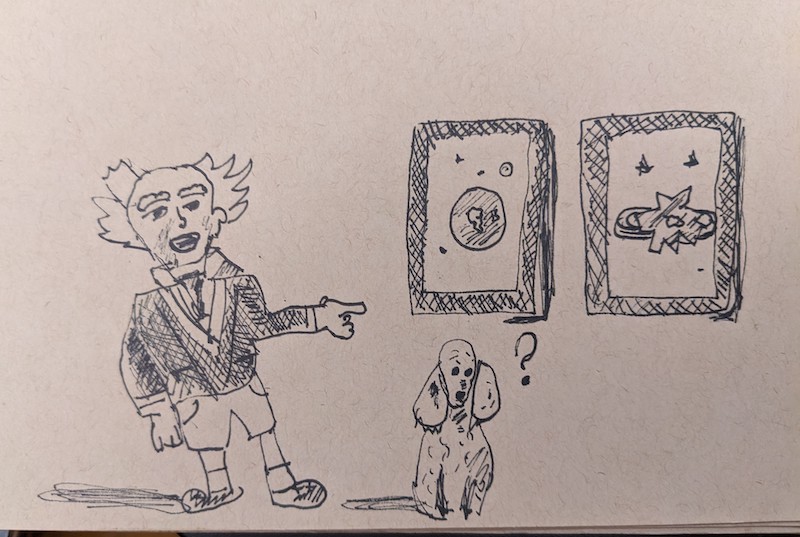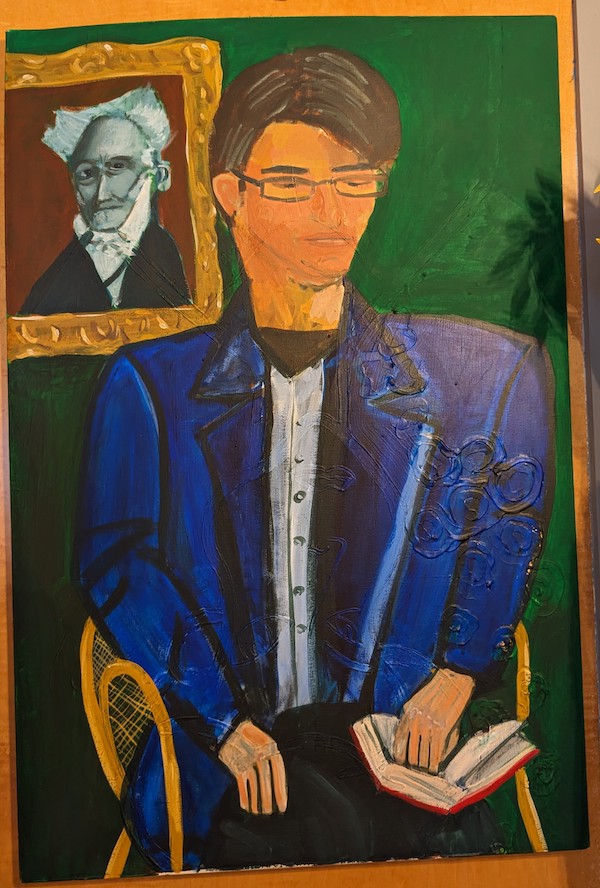Imaginary Books: Schopenhauer für Kinder
[imaginary-books children philosophy deutsch Premise: A children’s picture book about the philosophy of Arthur Schopenhauer, loosely organized on Die Welt als Wille und Vorstellung. The trick is to have a proper mix of depressing text/worldview and cheerful pictures. I think this will play better in the German market. Each text line has a full-page figure (italicized text description). Some quotations from Schopy to be typset in Fraktur as part of graphic. Outline and draft of text and images…
 Figure courtesy of Crayonfou
Figure courtesy of Crayonfou
Wer war Schopenhauer und was macht er?
[[Introduction…who is Schopenhauer. What is a philosopher. What is he famous for.]]
- [[Philosopher (what does a philosopher do?)]]
- [[Daily routine: Philosophy, flute, walk, reading, theater]]
- [[Emphasize his poodle, Atma]]
-
[[Maybe downplay kicking the landlady down the stairs and misogyny…]]
- Arthur Schopenhauer (1788-1860) war ein Philosoph, der in Frankfurt am Main lebte. Was ist ein Philosoph? Ein Philosoph ist ein Denker über die wichtigsten Fragen der Realität.
Erstes Buch: Die Vorstellung unterworfen dem Satze vom Grunde: das Objekt der Erfahrung und Wissenschaft.
- Kannst du die Welt wirklich kennen? Leider nicht.
-
Scientist in a labcoat. Looking a a telescope. Looking at a microscope
- Du siehst… du betastest… du hörst… du riechst… du schmeckst… aber alles ist nur Vorstellung.
-
Kid seeing, touching, listening to, etc. stuff
- Ein Traum erscheinst dich wahr, aber wenn du aufwachst, kennst du, dass er nur eine Vorstellung ist?
-
Kid in a dream being chased by a monster/waking up in bed in a dark room scared; split with a monster child dreaming of chasing a human/waking up in bed happy
- Leider ebenso ist die Realität. Deine Vorstellungen sind nur äußerlich. Und der Schein trügt.
-
Pictures of everyday things as “hollow” and filled with psychedelic colors
- Du kannst nie die echte Welt kennen. Du kannst nur Vorstellungen bekommen.
-
No idea how to illustrate this!
- Alle deinen Vorstellungen sind äußerlich außer einem: Der Wille. Vielleicht kannst du ihn kennenlernen!
- Constrast inner perspective/external perspective
Zweites Buch: Die Objektivation des Willens. (Book 2: Ontology)
- Was ist der Wille? Alles ist der Wille. Der Wille will immer mehr. Und der Wille liebt dich nicht.
-
Question mark. Hazy cloud “Der Wille”
- Die Atome wollen Moleküle werden. Die Moleküle wollen Sterne und Planeten werden.
-
Atoms to molecules to sun + planets + galaxy
- Ein Kaninchen will Karotten fressen, eine hübsche Kaninchenfrau lieben, Kaninchenkinder haben und in einem Kaninchenbau leben.
-
Picture of rabbit in a bowtie eating a slice of carrot cake (taken from a cake that looks like a carrot), with another rabbit and a heart, baby rabbits, a rabbit house
- Ein Wolf will das Kaninchen fressen … um seine eigenen Kinder zu füttern.
-
Wolf eating a rabbit-shaped cake (with ears)! … giving a slice to happy baby wolves around the table
- Du willst ein Spielzeug… einen Apfel … einen Pulli … einen Verband. Warum?
-
Child with toy, apple, sweater (shivering), band aid (for a skinned knee)
- Dein Körper will nicht traurig … nicht verhungern … nicht frieren … nicht sterben.
-
Body cross section. Brain…thought bubble of toy(!). Stomach … thought bubble of apple(!) Skin…thought bubble of sweater(!)
- Der Wille liebt nichts and niemand. Der Wille liebt nur großer zu werden.
- Show powers-of-ten style molecules-ecosystems-apartment building-cities-planet-galaxy
Drittes Buch: Die Vorstellung, unabhängig vom Satze des Grundes: die Platonische Idee: das Objekt der Kunst.(Book 3: Aesthetics)
- Kannst du wirklich glücklich sein? Leider nicht.
-
Smiling child, playing with a marionette toy
- Der Wille macht dich immer unzufrieden.
-
Blue cloud of Der Wille up above…pulling marionette strings of the child as puppet (who is himself playing with a marionette toy, but is now unhappy with it)
- Nach dem Essen wirst du nochmal Hunger haben.
-
Picture of kid eating (night time). Then picture of daytime and thought bubble of apple from stomach. (keep the Will/puppet strings from previous picture here)
- Deine Spielzeuge werden sich kaputt. Diene Eltern und Freunde werden dich verlassen.
-
Picture of broken toy. Picture of a funeral.
- Du wirst enttäuscht werden, krank werden, sterben. Vielleicht ist es nicht so schlecht.
- Picture of kid crying?, sick in bed, in a coffin, flower growing on grave & happy worms eating corpse
-
,,Jeden Abend sind wir um einen Tag ärmer.’’
- Du kannst dich beim Kunst vergnügen. Für eine kurze Zeit vergesse den Willen!
- Museum wall with Dutch still-life paintings. Have Schopenhaur portrait pointing at still life
- ,,Jedes Kind ist gewissermaßen ein Genie und jedes Genie gewissermaßen ein Kind.’’
- Kid painting a Picasso style painting in the foreground, and in the background a Picasso-style painting of a painter painting a child
Viertes Buch: Bei erreichter Selbsterkenntniß Bejahung und Verneinung des Willens zum Leben. (Book 4: Ethics)
- Du hast eine Wahl: Unterstütze den Willen oder nicht. Was willst du?
-
Happy kid with exclamation point
- Der Wille macht das Leben voll von Wünschen. Lebe ohne Wünsche, und du wirst Freude haben.
- return to picture of kid with thought bubbles. Put a big “cancel” circle on each of the thought bubbles.
-
,,Wir denken selten an das, was wir haben, aber immer an das, was uns fehlt.’’
- Magst du dich diese Wünsche versagen?
-
?
- Wann du Lust auf etwas hast, vernein sie!
-
?
- Gib deine Lieblingsspielzeuge zu andere Kinder.
- Giving toy to other children
-
,,Das Geld gleicht dem Seewasser. Je mehr davon getrunken wird, desto durstiger wird man.’’
- Sei immer gut zur böse, unglücklich und dumm Tiere (und Menschen).
- Feeding an angry Atma (his poodle)
-
,,Wer gegen Tiere grausam ist, kann kein guter Mensch sein.’’
- Du wird noch leiden. Schade.
- Kid getting beat up after giving away toys and feeding angry dogs
-
,,Die Menschen sind wesentlich böse, wesentlich unglücklich, wesentlich dumm.’’
- ,,Das Schicksal mischt die Karten, wir spielen.’’
- Picture of a poker table, with cards depicting different happy and sad fates that have been depicted in the book
Parerga and Paralipomena
-
Brian Magee’s interview with Frederick Copleston, S.J. about Schopenhauer is great … I love how Copleston speaks about Schoppy as if he was a somewhat disreputable schoolmate of his.
-
Paul Strathern, Schopenhauer in 90 Minutes (1999)…a short, breezy read with an introduction to Schoppy’s life and thought. Sort of an adult version of our book
-
Schopy und ich (another Crayonfou original, in the style of Max Beckman)
